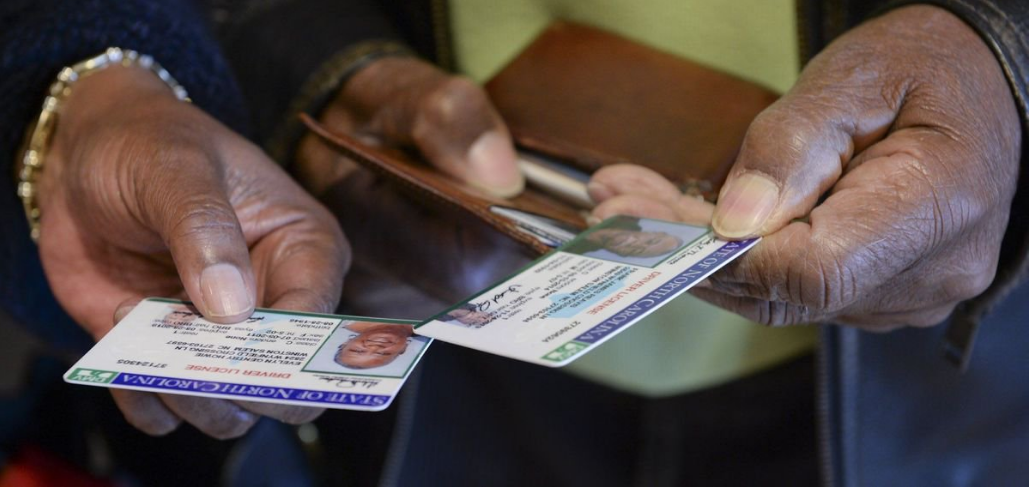Federal Court Decision Reveals Racist Voter ID Laws

By:
On Friday, a federal appeals court struck down a North Carolina voter ID law in an unanimous decision.
Supported by Gov. Pat McCrory (R-NC), the law — which resulted in lawsuits from the the U.S. Justice Department, state NAACP, and League of Women Voters — required voters to bring photo identification and was widely thought to disproportionately impact black Americans in the state who have overwhelmingly voted for Democrats in the past.
Quotes pulled from the court's decision, reported Friday on the Washington post, detail the discriminatory law.
The court deemed that voter photo ID laws unfairly impact black voters.
"The law required in-person voters to show certain photo IDs, beginning in 2016, which African Americans disproportionately lacked, and eliminated or reduced registration and voting access tools that African Americans disproportionately used," the decision explains.
It continues: "With race data in hand, the legislature amended the bill to exclude many of the alternative photo IDs used by African Americans. The bill retained only the kinds of IDs that white North Carolinians were more likely to possess."
“A lot of people don’t realize what it takes to obtain an ID without the proper identification and papers,” lawyer Abbie Kamin told the Washington Post in May. “Many people will give up and not even bother trying to vote.”
Black, Hispanic, elderly, and low income voters are most impacted by these requirements, the report explains.
But the law didn't stop at identification.
Before enacting the voter id law, state legislature "requested data on the use, by race, of a number of voting practices," the court said. "Upon receipt of the race data, the General Assembly enacted legislation that restricted voting and registration in five different ways, all of which disproportionately affected African Americans."
These measures required voters to cast ballots in person with a photo ID, curtailed early voting, and "eliminated same-day registration and voters' ability to cast out-of-precinct provisional ballots in their home counties," NBC News explains.
Black voter participation has surged in North Carolina — which could potentially hurt the GOP.
The court claimed that the spike in Black voters participating in the states elections "swelled by 51.1 percent" between 2000 and 2012. "Not coincidentally, during this period North Carolina emerged as a swing state in national elections," the decision continues.
"After years of preclearance and expansion of voting access, by 2013 African American registration and turnout rates had finally reached near-parity with white registration and turnout rates," the decision reports. "African Americans were poised to act as a major electoral force."
Since black voters tend to support Democratic candidates in North Carolina, the law could potentially skew elections.
 Twitter/_North_Carolina - twitter.com
Twitter/_North_Carolina - twitter.com
The court concluded that the law clearly benefited the Republican party, whose leaders staunchly defended it.
"In North Carolina, restriction of voting mechanisms and procedures that most heavily affect African Americans will predictably redound to the benefit of one political party and to the disadvantage of the other," the decision reads. "As the evidence in the record makes clear, that is what happened here."
The decision called the law a "smoking gun" — ie. conclusive evidence of a crime or wrongdoing.
The State then elaborated on its justification, explaining that “[c]ounties with Sunday voting in 2014 were disproportionately black” and “disproportionately Democratic," the decision reads.
"Research by political scientists at Dartmouth College and the University of Florida concluded that 'Democratic, African American, Hispanic, younger, and first-time voters were disproportionately likely to vote early in 2008 and in particular on weekends, including the final Sunday of early voting,' the Huffington Post explains.
Record numbers of Black voters also participated in the 2008 and 2012 elections, the Post reported in a previous story.
"Thus, in what comes as close to a smoking gun as we are likely to see in modern times, the State’s very justification for a challenged statute hinges explicitly on race — specifically its concern that African Americans, who had overwhelmingly voted for Democrats, had too much access to the franchise," the decision reads.
"Faced with this record," the decision asserts, "we can only conclude that the North Carolina General Assembly enacted the challenged provisions of the law with discriminatory intent."
Similarly restrictive voting laws in Wisconsin and Kansas also took hits on Friday, the AP reports. While supporters of voter id laws say they're a measure to prevent fraud, researchers have found that reports of voter fraud are roughly as common as reports of alien abduction, according to the Washington Post.
